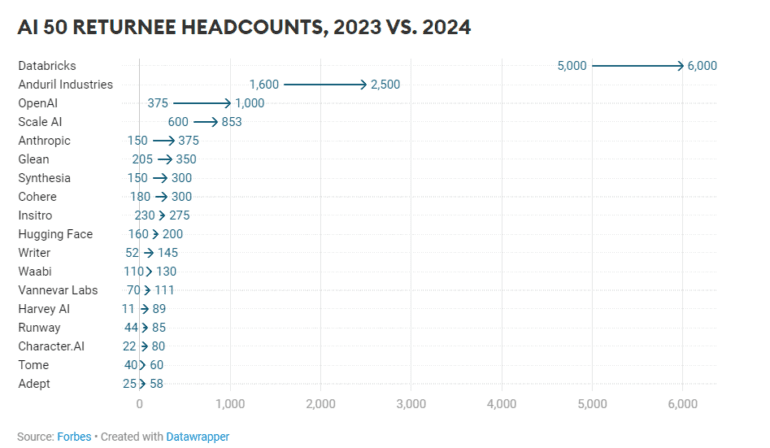- The latest Forbes AI 50 list showcases a shift towards younger, more agile startups in the AI sector.
- While established players like Anduril Industries, Databricks, and OpenAI retain their positions, the spotlight is on the 28 new entrants.
- Startups are excelling in selling AI infrastructure and applying AI to real-world problems.
- Notable examples include Pinecone, LangChain, AssemblyAI, Abridge, Sierra, and Notion.
- Investors are bullish on AI startups, with significant funding rounds driving valuations to $1 billion or more for many companies.
- Despite market challenges, AI startups continue to attract investment, signaling resilience.
- Efficiency is a hallmark of these startups, achieving remarkable milestones with leaner teams compared to incumbents.
- Mistral AI, a Paris-based startup, exemplifies this trend with a $2 billion valuation within a year.
- Europe emerges as a vibrant AI hub, with startups like Mistral, Photoroom, Cradle, and ElevenLabs making waves.
- Major hubs in London, Paris, and Zurich are witnessing a surge in promising AI startups, challenging traditional tech hubs.
Main AI News:
In the realm of artificial intelligence (AI), the landscape is rapidly evolving, with startups becoming increasingly streamlined and agile. While OpenAI’s Sam Altman once envisioned a billion-dollar company with just one employee, the reality is gradually moving towards that vision, as evidenced by the latest Forbes AI 50 list.
This year’s AI 50 features only a handful of companies boasting 1,000 employees or more, such as Anduril Industries, Databricks, and OpenAI itself. However, the spotlight is on the newcomers, with 28 debutants marking their presence on the list. These fresh faces signify a burgeoning economy centered around AI innovation, characterized by smaller teams and significant potential for growth.
A significant portion of these newcomers has made remarkable strides in selling AI infrastructure or applying AI to practical use cases. Pinecone, LangChain, and AssemblyAI are prime examples, with valuations soaring into the hundreds of millions. Others, like Abridge and Sierra, are carving out niches in AI-driven healthcare and customer service, respectively, while behemoths like Notion are integrating cutting-edge AI into productivity tools.
Konstantine Buhler, a partner at Sequoia Capital, foresees a future where AI permeates every facet of business operations, akin to the digital transformation of yesteryears.
The AI 50’s roster reflects a trend wherein startups secure substantial funding at a younger age and with leaner teams than ever before. This trend stands in stark contrast to sectors like cryptocurrency and fintech, which are grappling with market downturns. Among the AI 50 companies disclosing their valuations, a significant portion are valued at $1 billion or more, indicating robust investor confidence in AI’s potential.
Even amidst market uncertainties, AI startups continue to attract massive investments, underscoring their resilience and growth potential. Notable investors, including Jeff Bezos and tech giants like Amazon, Google, and Microsoft, are placing their bets on AI startups, further fueling the sector’s expansion.
However, what sets AI startups apart is their ability to achieve remarkable milestones with relatively small teams. Despite reporting an increase in employees, the AI 50’s mean and median headcounts have decreased, highlighting the efficiency and agility inherent in these companies.
Even the largest AI startups, such as OpenAI, operate with a fraction of the workforce compared to industry incumbents, signaling a paradigm shift in the competitive landscape. Mistral AI, a Paris-based startup, exemplifies this trend, boasting a $2 billion valuation within just a year of its inception.
Europe, in particular, is emerging as a hotbed of AI innovation, with a growing number of startups making waves on the global stage. The continent’s rich talent pool and supportive ecosystem are nurturing the growth of companies like Mistral, Photoroom, Cradle, and ElevenLabs, many of which have roots in renowned institutions like Google-owned DeepMind.
As Europe’s AI ecosystem flourishes, major hubs in cities like London, Paris, and Zurich are witnessing a surge in promising startups, challenging the dominance of traditional tech hubs.
Conclusion:
The rise of youthful and efficient AI startups, as evidenced by the latest AI 50 list, signifies a transformative shift in the market. With investors increasingly betting on innovation and efficiency, established players may face heightened competition from agile newcomers. Moreover, the emergence of vibrant AI ecosystems in Europe underscores the global nature of AI innovation, presenting both opportunities and challenges for traditional tech hubs.

